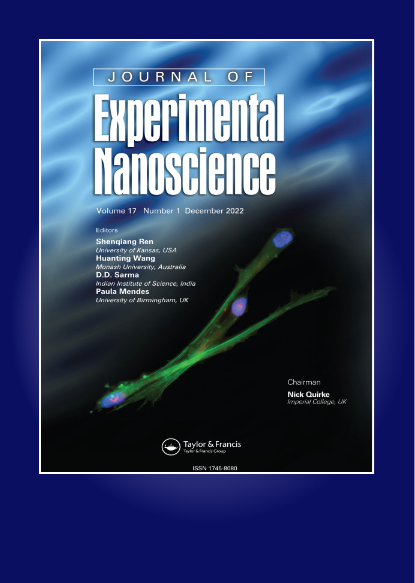A convergent synthetic platform of gold/silica nanomaterials functionalized gelatin/chitosan hydrogel framework for the bone fracture treatment
IF 2.8
4区 材料科学
Q2 CHEMISTRY, MULTIDISCIPLINARY
引用次数: 2
Abstract
Abstract To establish a gold/silica hybrid, nanomaterials (Au/SiO2) were incorporated into a gelatin methacrylate/chitosan matrix. By using FESEM, compressive strength testing, and conductivity/resistance measurements on gelatin (G)/chitosan (C), G/C-Au@SiO2 hydrogels developed. Biocompatibility investigations on osteoblasts MG-63 cells were carried out to determine whether the cell was compatible with the conductive hydrogel as it had been created. The results indicated that HNPs had improved compressive strength and conductivity without losing the favourable features such as biodegradable nature and porous shape of G/C hydrogel. The mechanical properties and Elastic modulus of composites hydrogels were enhanced twofold when hybrid nanomaterials were added to the mixture. The cyclic compressive analysis shows that pure G/C hydrogels lost their mechanical stability within the first few cycles, but G/C-Au@SiO2 hydrogels lasted for up to fifty cycles. It was demonstrated that osteoblast proliferation and adhesion were increased on the hydrogel in the CCK-8 experiment. Further, the cell survival of the hydrogels with G/C-Au@SiO2 conductivity was enhanced by 15% compared to that of pure G/C hydrogels. The morphological features of the MG-63 cells experiments were performed by using a Fluorescein diacetate hydrolysis (FDA) staining assay. This work offers a unique method for enhancing mechanical integrity and electrical properties in gelatin-based G/C hydrogels by adding bifunctional hybrid nanomaterials (HNPs) for bone fracture tissue engineering applications.金/二氧化硅纳米材料功能化明胶/壳聚糖水凝胶框架融合合成平台的研究
摘要将纳米材料(Au/SiO2)掺入甲基丙烯酸明胶/壳聚糖基质中,建立金/二氧化硅杂化物。通过对明胶(G)/壳聚糖(C)的FESEM、抗压强度测试和电导率/电阻测试,制备了G/C-Au@SiO2水凝胶。对成骨细胞MG-63细胞进行了生物相容性研究,以确定细胞是否与制备的导电水凝胶相容。结果表明,HNPs具有较好的抗压强度和导电性,同时又不失G/C水凝胶的可生物降解性和多孔性等优点。混合纳米材料的加入使复合材料水凝胶的力学性能和弹性模量提高了2倍。循环压缩分析表明,纯G/C水凝胶在前几个循环中失去了力学稳定性,而G/C-Au@SiO2水凝胶可以持续50个循环。CCK-8实验表明,水凝胶使成骨细胞增殖和粘附增强。此外,与纯G/C水凝胶相比,具有G/C-Au@SiO2电导率的水凝胶的细胞存活率提高了15%。采用双醋酸荧光素水解法(FDA)染色法观察MG-63细胞的形态学特征。这项工作提供了一种独特的方法,通过添加双功能杂化纳米材料(HNPs)来增强明胶基G/C水凝胶的机械完整性和电性能,用于骨折组织工程应用。
本文章由计算机程序翻译,如有差异,请以英文原文为准。
求助全文
约1分钟内获得全文
求助全文
来源期刊

Journal of Experimental Nanoscience
工程技术-材料科学:综合
CiteScore
4.10
自引率
25.00%
发文量
39
审稿时长
6.5 months
期刊介绍:
Journal of Experimental Nanoscience, an international and multidisciplinary journal, provides a showcase for advances in the experimental sciences underlying nanotechnology and nanomaterials.
The journal exists to bring together the most significant papers making original contributions to nanoscience in a range of fields including biology and biochemistry, physics, chemistry, chemical, electrical and mechanical engineering, materials, pharmaceuticals and medicine. The aim is to provide a forum in which cross fertilization between application areas, methodologies, disciplines, as well as academic and industrial researchers can take place and new developments can be encouraged.
 求助内容:
求助内容: 应助结果提醒方式:
应助结果提醒方式:


